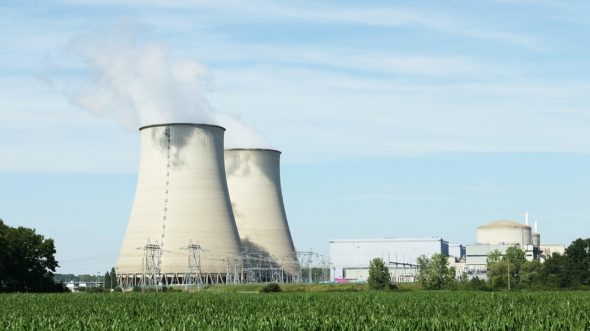Poland’s nuclear power plant construction program has been riddled with ambiguity for many years. Nevertheless, among the few certainties remains the necessity to abide by the EU law on granting state aid. The project cannot happen without Brussels. Investments in nuclear energy are one of the most expensive in the energy sector, which is why building a nuclear plant in Poland will not be possible without state support. Therefore, the European Commission will have to approve the selected financing model – Paweł Wróbel, CEO of Gate Brussels, writes for BiznesAlert.pl.
Recently in a reaction to the plans made by Warsaw, Frans Timmersmans, Executive Vice President of the European Commission for the European Green Deal, has stressed that the EC would not stand in the way of building nuclear power plants (NPPs) in member states. This assurance was also offered to the prime minister of the Czech Republic, who announced before the last EU summit, that his country would support the increase in CO2 reduction target to 55 percent by 2030, only if the EC did not interfere with nuclear programs. Timmermans really wants all the member states to support the increased CO2 emissions reduction target. Even though it is Margrethe Vestager, another EC Executive Vice President, who is responsible for competition, Timmerman’s voice will be very important when it comes to the decision process.
Timmermans is a seasoned diplomat, a former foreign minister of Holland, so it is worth paying attention to the entirety of his statement to learn what he thinks about these kinds of investments in the energy sector. In his opinion, nuclear power had „serious disadvantages”, e.g. the necessity to import uranium and handle radioactive waste. He also pointed out that nuclear power was „very expensive”, which is why long-term state involvement was crucial. „… [I]f you invest in it, you’re stuck with it for a very, very long period of time,” he stressed. Still, Timmermans did not openly admit that the European Commission did not bet on nuclear power, even in the context of the 2050 climate neutrality target. However, this approach is visible in the Union’s main strategies, which determine the target energy transition model. The strategies were adopted last July and are titled: the EU Strategy for Energy System Integration and the Hydrogen Strategy. Neither of the documents suggests that nuclear energy will play a significant role in the European Green Deal. The EC has been consistent in its push for renewable energy sources (RES) as the basis for energy generation in the EU, and the most cost-efficient option. Renewables will make it possible to electrify heat generation and transport. While hydrogen will play a complementary role, especially when it comes to industrial processes and heavy transport. This approach is reflected in the ongoing revisions of the main legislation for the energy sector. The goal of this strategy is to achieve climate neutrality by 2050. Nuclear energy is not an important part of this model. The situation is similar when it comes to EU funding mechanisms and regulations on public and private entities on financial markets in EU states, e.g. in taxonomy. Nuclear power is not considered environmentally sustainable, and there is little hope this approach will change. Therefore, the possibilities for bankrolling nuclear energy are very limited. The availability of options is a lot smaller than in case of RES or hydrogen. Of course, the EC respects the principle of „technological neutrality”, so it cannot deprive states of their ability to invest in nuclear energy, especially that some of them do bet on this kind of power generation. However, this means it is necessary to find a model that will be in line with EU law.
One of the biggest challenges is to prepare a financing model for the investment that will comply with EU rules for state aid. The EC has stressed its role is to limit as much as possible any interference with competition on the energy market that state aid may cause. During its inquiries into state aid plans, e.g. with regard to nuclear energy, the EC holds talks with governments that plan such investments. The EC then determines what conditions need to be met for it to approve the aid. This happened, e.g. in 2017 when Hungary wanted to expand its Paks II NPP. The Hungarian government had to take on considerable commitments for the EC to agree the investment was in line with EU rules. Those included the following: (1) profits could only be used to pay off debt to the state, or to cover the NPP’s operational costs, (2) Paks II could not be formally linked with other entities on the energy market, including the existing Paks power plant, which meant it had to survive on the market on its own, (3) at least 30 percent of the production had to be sold on the open energy market, whereas the remainder via an open auction system. Especially the last condition could be too difficult to meet, as nuclear energy is one of the most expensive when it comes to new investments.
In case of Poland an EC consent will not be unconditional either. The process usually takes a dozen or so months. In case of Paks II it took 3 years. These are one of the most difficult and one of the longest cases. The final conditions that the EC will set, will determine not just the construction process, but mostly the terms on which the NPP will have to function on the market.
